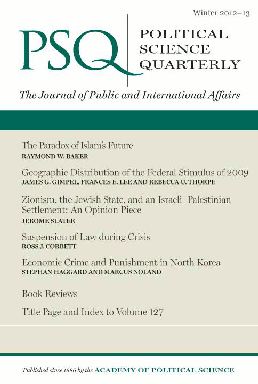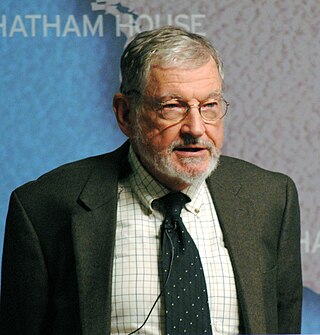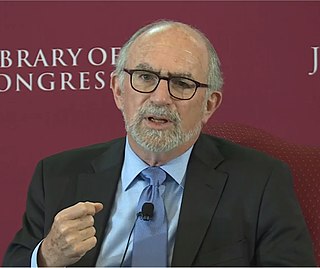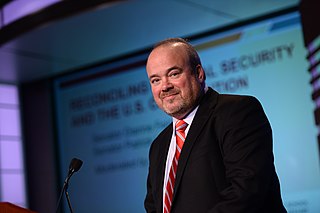Related Research Articles
Political science is the scientific study of politics. It is a social science dealing with systems of governance and power,and the analysis of political activities,political thought,political behavior,and associated constitutions and laws.
Public opinion,or popular opinion,is the collective opinion on a specific topic or voting intention relevant to society. It is the people's views on matters affecting them. The term originates from France,and first appeared in the 17th century,though writers had identified the importance of the opinion of the people long before this. Prior to the advent of mass media,public fora such as coffee houses and gentlemen's clubs were used as exchanges of opinion and some reputable locations had great influence.
Michael W. Doyle is an American international relations scholar who is a theorist of the liberal "democratic peace" and author of Liberalism and World Politics. He has also written on the comparative history of empires and the evaluation of UN peace-keeping. He is a University professor of International Affairs,Law and Political Science at Columbia University - School of International and Public Affairs. He is the former director of Columbia Global Policy Initiative. He co-directs the Center on Global Governance at Columbia Law School.

Robert Jervis was an American political scientist who was the Adlai E. Stevenson Professor of International Politics in the Department of Political Science at Columbia University. Jervis was co-editor of the Cornell Studies in Security Affairs,a series published by Cornell University Press.

Political Science Quarterly is an American double blind peer-reviewed academic journal covering government,politics,and policy,published since 1886 by the Academy of Political Science. Its editor-in-chief is Robert Y. Shapiro. Each issue consists of five or six articles as well as up to 40 book reviews.

John E. Mueller is an American political scientist in the field of international relations as well as a scholar of the history of dance. He is recognized for his ideas concerning "the banality of 'ethnic war'" and the theory that major world conflicts are quickly becoming obsolete.

Bruce W. Jentleson is a professor of public policy and political science at Duke University,where he served from 2000 to 2005 as Director of the Terry Sanford Institute of Public Policy. He previously was a professor at the University of California,Davis and Director of the UC Davis Washington Center. In addition to his academic career,he has served in a number of foreign policy positions in Democratic administrations.

Andrew Kohut was an American pollster and nonpartisan news commentator about public affairs topics.
The Academy of Political Science is an American non-profit organization and publisher devoted to cultivating non-partisan,objective analysis of political,social,and economic issues. It is headquartered in The Interchurch Center in New York City. Its current President is Robert Y. Shapiro.
James A. Davis (1929–2016) was a distinguished American sociologist who is best known as a pioneer in the application of quantitative statistical methods to social science research and teaching. Most recently,he was a Senior Lecturer in Sociology at the University of Chicago.
The Roper Center for Public Opinion Research at Cornell University is the world's oldest archive of social science data and the largest specializing in data from public opinion surveys. Its collection includes over 27,000 datasets and more than 855,000 questions with responses in Roper iPoll,adding hundreds more each year. The archive contains responses from millions of individuals on a vast range of topics. The current executive director of the center is Jonathon P. Schuldt,Associate Professor of Communication at Cornell University,with a governing board of directors chaired by Robert Y. Shapiro of Columbia University.

Lawrence D. Bobo is the W. E. B. Du Bois Professor of the Social Sciences and the Dean of Social Science at Harvard University. His research focuses on the intersection of social psychology,social inequality,politics,and race.
Adam J. Berinsky is a professor of political science at the Massachusetts Institute of Technology. He is the author of the 2004 book Silent Voices:Public Opinion and Political Participation in America and the 2009 book In Time of War:Understanding Public Opinion,From World War II to Iraq.
Everett Carll Ladd Jr. was an American political scientist based at the University of Connecticut. He was best known for his analysis and collection of public opinion polls. He directed the Roper Center for Public Opinion Research at the University of Connecticut;the Center's mission is to collect and preserve the reports and the original raw computerized data of polls and surveys since the 1930s. At his death,he had amassed 14,000 surveys from many countries. He was also an expert on the opinions and careers of social scientists.
Robert Mathew Entman is the J.B. and M.C. Shapiro Professor of Media and Public Affairs and Professor of International Affairs at George Washington University.
Robert J. Blendon is an American academic who is the Richard L. Menschel Professor of Public Health and Professor of Health Policy and Political Analysis,Emeritus and Acting Director for the Division of Policy Translation and Leadership Development at the Harvard T.H. Chan School of Public Health. He previousy held appointments as a Professor of Health Policy and Political Analysis at the Harvard T.H. Chan School of Public Health and the Harvard Kennedy School of Government. Hhe directs the Harvard Opinion Research Program and co-directs the Robert Wood Johnson Foundation/Harvard T.H. Chan School of Public Health project on understanding Americans’Health Agenda. Previously,he co-directed a polling series with The Washington Post and Kaiser Family Foundation.

John Lapinski is the Robert A. Fox Professor of Political Science,Faculty Director of the Robert A. Fox Leadership Program and the Director of the Penn Program on Opinion Research and Election Studies (PORES) at University of Pennsylvania. He also serves as the Faculty Director for the Executive Masters of Public Administration program within the Fels Institute of Government.

Lawrence R. Jacobs is an American political scientist and founder and director of the Center for the Study of Politics and Governance (CSPG) at the University of Minnesota. He was appointed the Walter F. and Joan Mondale Chair for Political Studies at the University of Minnesota's Humphrey School of Public Affairs in 2005 and holds the McKnight Presidential Chair. Jacobs has written or edited,alone or collaboratively,17 books and over 100 scholarly articles in addition to numerous reports and media essays on American democracy,national and Minnesota elections,political communications,health care reform,and economic inequality. His latest book is Democracy Under Fire:Donald Trump and the Breaking of American History. In 2020,he was elected a Fellow of the American Academy of Arts and Sciences.
Douglas Rivers is an American political scientist. He is Professor of Political Science at Stanford University and Senior Fellow at the Hoover Institution. He also served as the president and CEO of YouGov/Polimetrix and is currently the global polling firm's chief scientist.

Christina M. Greer is an American political scientist who researches U.S. politics,black ethnic politics,urban politics,and public opinion. She is an associate professor of political science at Fordham University.
References
- ↑ "Robert Y. Shapiro | Political Science". polisci.columbia.edu. Retrieved 2022-01-25.
- ↑ "Board of Directors | Roper Center for Public Opinion Research". ropercenter.cornell.edu. Retrieved 2022-01-25.
- 1 2 "Political Science Quarterly". www.psqonline.org. Retrieved 2022-01-25.
- 1 2 "Robert Y. Shapiro" (PDF). Columbia University. February 2017. Retrieved January 24, 2022.
- ↑ "New Fellow Robert Shapiro to Focus on Domestic Perceptions of Foreign Policy". Council on Foreign Relations. Retrieved 2022-01-25.
- ↑ "AAAS News and Notes". Science. 326 (5960): 1656–1660. 2009-12-18. Bibcode:2009Sci...326.1656.. doi: 10.1126/science.326.5960.1656 .
- ↑ "2001 - Goldsmith Awards". 2021-03-12. Retrieved 2022-01-25.